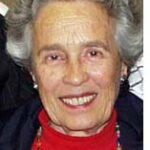By Eileen Wingard

LA JOLLA, California — The La Jolla Symphony and Chorus, under the direction of Chorus Director, Arian Khaefi, delivered an impressive reading of Felix Mendelssohn’s Oratorio, Elijah, in the final program of their 2024-25 season at Mandeville Hall on June 8.
This work, more dramatic than oratorios of earlier composers, uses mostly texts from the Hebrew Bible’s Book of Kings and Psalms, compiled by Mendelssohn’s friend, the theologian, Julius Schubring, pastor in Dessau, the city of Felix’s grandfather’s birth.
“I imagined Elijah as a real prophet,” Mendelssohn wrote Schubring, “the kind we could really do with today: strong, zealous, and yes, even bad-tempered, angry and brooding.”
Through stirring choruses, alternating with arias, duets, trios and quartets by four soloists, connected by sung recitatives and accompanied by a full symphony orchestra, episodes of Elijah’s life unfolded.
Kenneth Overton’s resonant baritone brought strong conviction to the role of Elijah as he opened, foretelling a drought as punishment for idolatry. Karen Vuong’s soprano rang forth with dramatic fervor as the distraught mother of her deceased son, whom Elijah managed to revive. Mezzo Sarabeth Balon was a well-cast Jezebel and angel and tenor Aaron Humble served admirably as King Ahab and Obadiah.
Although her role was small, Rohini Prabhakar’s pure soprano voice as the youth whom Elijah sent forth to find a cloud and bring rain, were particularly impressive.
The choruses were, as Queen Victoria remarked, “very fine.”
The combined choruses of both La Jolla and San Diego State University, where Khaefi is the Associate Professor and Director of Choral Studies, sang with excellent ensemble, good intonation and nuanced dynamics. One of the highlights was when they sang as the Priests of Baal loudly urging the idol to, “Hear and Answer,” followed by a stark silence.
The orchestra shone in the overture’s fugal complexity.
Elijah’s aria, “It Is Enough,” where the prophet expresses his despair, was beautifully accompanied by a cello solo, played by cellist Gabriella Carr.
The final “Amen,” brought the audience to its feet. Almost 200 years after it was written, Elijah’s beauty and power still has a strong impact on listeners today.
Mendelssohn wrote Elijah during the spring and summer of 1846, to be performed that August in the Birmingham Triennial Festival in England. Although he composed it to a German text, it was translated into English for its premiere, where it was received with triumphal acclaim.
Felix Mendelssohn was the grandson of the great German-Jewish philosopher and leader of the Enlightenment, Moses Mendelssohn. Moses died before Felix was born, and when the composer was eight years old, he and his three siblings were converted to Christianity. The parents, Abraham Mendelssohn and Lea Salomon Mendelssohn, were convinced by his uncle, Jacob Salomon Bartholdy, that Felix and his siblings could better develop their talents and succeed if they were of the same religion as the majority of German society.
Mendelssohn’s first oratorio, St. Paul, was inspired by the New Testament figure. However, Felix may have been drawn to the biblical prophet, Elijah, because of his Jewish heritage and his famous grandfather. The oratorio remains one of his most frequently performed works.
Interestingly, Charles Salaman adapted “He that Shall Endure to the End” from Elijah as a setting for Psalm 93 (Adonai Malakh), sung on most Friday nights at the Sabbath-eve service of the London Spanish & Portuguese Jewish Synagogue.
*
Eileen Wingard, a retired violinist with the San Diego Symphony Orchestra, is a freelance writer specializing in coverage of the arts.